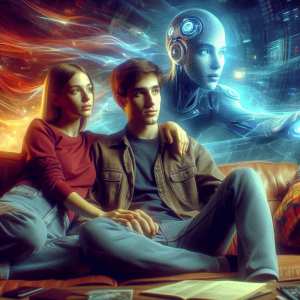
(Previous)…..(Content)…..(Next)
Other Participants in the World of Childhood
Ts
(Romanian)

For a child avid for “Science Fiction”, the world described in the previous episodes only refers to some arbitrary, “childish” benchmarks… Well-known is the “psychological effect” manifested in childhood, that of “non-selective” and, rather, “focused” attention on “native” pleasures…
But, “in the background”, the greed of the child’s perception also perceives the other participants in a crazy world, when childhood manifests itself “like an unlimited sponge” that absorbs everything it touches…
With the price that the future adult will pay by becoming that something called “individuality”, which will fit or not in the social environment (calling yourself a “nerd” or the like)…
At least, in the lands where I grew up, the pejorative expression “evaluation” was used to associate with impossible plans (in the evaluation of the “audience”) associated with the gestures, actions, involvement, blah, blah of an “evaluated” “individual” that sounded like so “What nonsense! This is science fiction!”…
Or, typical of the “political” zone, “Nonsense like the Western papers! Sci-fi.”…
Apart from the “Star Trek” case, which seemed quite palpable, tangible, of a possible future…
I noticed most of such “evaluations” when I watched the original “The Outer Limits” (made between 1963 and 1965) as a child, followed much later by the “new-old” “The Outer Limits” when I was already an adult (between 1995 and 2002).
It was “essentially” an anthology series (a “suite” of independent stories with different characters and plots, allowing for the exploration of a variety of themes and topics while maintaining a sense of novelty and surprise — like many others) that captured the imagination of audiences with its unique take on science fiction and horror themes, exploring a wide range of subjects from alien encounters and time travel to paranormal phenomena and failed science experiments.
It was distinguished by its dark and mysterious atmosphere, with music, special effects, and cinematography helping to create a mood of suspense and sometimes horror.
But beyond the science fiction and horror elements, the series often tackles deep philosophical themes such as the nature of humanity, the consequences of science, and the exploration of the unknown.
“The Outer Limits” is considered one of the series that defined the science fiction genre on television. Many of the themes and ideas explored in this series inspired other productions, “among others,” becoming staples of the genre.
The original version is famous for its innovative special effects for the time and its serious approach to science fiction themes, the 1995 “revival” “updated” the series’ visuals and added new elements, keeping the “original essence”, and the “revival” in 2002 (which I haven’t mentioned before) was sort of a last-ditch attempt to revive The Outer Limits, the “worst rated” compared to the previous ones, although it did offer some memorable episodes.

And so far, we’ve discussed the “heavies” of the genre from the 60s-70s. But do you think I don’t have other “memories”?
But, I have quite vivid memories of the series “Lost în Space” (made in the period 1965–1968), a series that was a real “sensation” in its time and that inspired many generations.
Its popularity led to several attempts to bring the Robinsons (including the robot) back into the public eye, such as the 1998 remake (a modernized and darker version of the original series, which unsuccessfully attempted to attract a younger audience), or the 2018 Netflix remake (which, this time, was a considerable success, thanks to more complex characters against the “background” of a darker, more “hard science fiction” atmosphere).
Another “living memory” is related to the series “Land of the Giants”, made between 1968 and 1970 (a series about the crew of a plane that crashes on a planet inhabited by giants, the series explores interesting themes about perception and interpersonal relationships in — an extreme environment).
And, why not, even about the 1968–1969 TV series The Invaders (a darker sci-fi drama that follows one man’s efforts to expose an alien conspiracy)…
With fairly clear “slips” also in the case of the series “Get Smart”, made between 1965 and 1970 (a spy comedy with elements of science fiction, which satirizes the genre of espionage and thrillers, series that “attracted” similar subsequent titles, with quite similar themes, in the world of “feature” films, but which did not “enjoy” the initial success).
And now, I’ve described enough elements for you to realize that (after only 6 “episodes”) both written science fiction and the experimental but successful process of television movies have created a “bridge to the screen (including television, video games, blah, blah)” real, consistent for the great successes of “Science Fiction” that will follow, starting from the late 70s (more precisely, the year of grace 1977), which is constituted to be “The New Age of Science Fiction” (in my humble opinion)…
A magnificent “Bridge to the Screen” made by “Close Encounter of the Third Kind” (Spielberg’s), “Star Wars” (Lucas’s three “episodes”), “Superman” (Reeve’s), “Mad Max” (by Gibson), “Alien” (by Ridley Scott), and the advent of the “feature-length” “Startrek” films, which will propel the “general” preferences manifest in “Science Fiction” and “species” assimilated.
Even at the level of science fiction literature, it stands out as the end of a transitional period, after the explosion of ideas and themes in the 60s, as well as after the strong influence of the cyberpunk movement that was beginning to take shape, being easy to ascertain some consolidation and diversification of the genre (and subgenres).
Thus, after the intense experimentation of the previous years, science fiction subgenres began to take shape more clearly, witnessing an increase in the popularity of space novels, dystopias, hard SF (science fiction based on solid science), and biopunk.
Then, although the cyberpunk movement was not yet fully developed, its ideas of technology, powerful corporations, and dystopian societies began to infiltrate science fiction literature, influencing many authors.
And why not, sci-fi writers continued to explore social themes relevant to the time, such as pollution, overpopulation, the Cold War, and the impact of technology on society.
Or, more and more authors appeared from different cultures and with different perspectives, leading to a diversification of themes and narrative styles.

So, without forgetting that a film (or a television series) is necessarily based on a written work, the end of the 70s was a period of consolidation and diversification for science fiction literature, by exploring complex themes and experimenting with different narrative styles, with sci-fi authors setting the stage for a new era of the genre that would explode in the years to come.
Merticaru Dorin Nicolae




